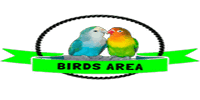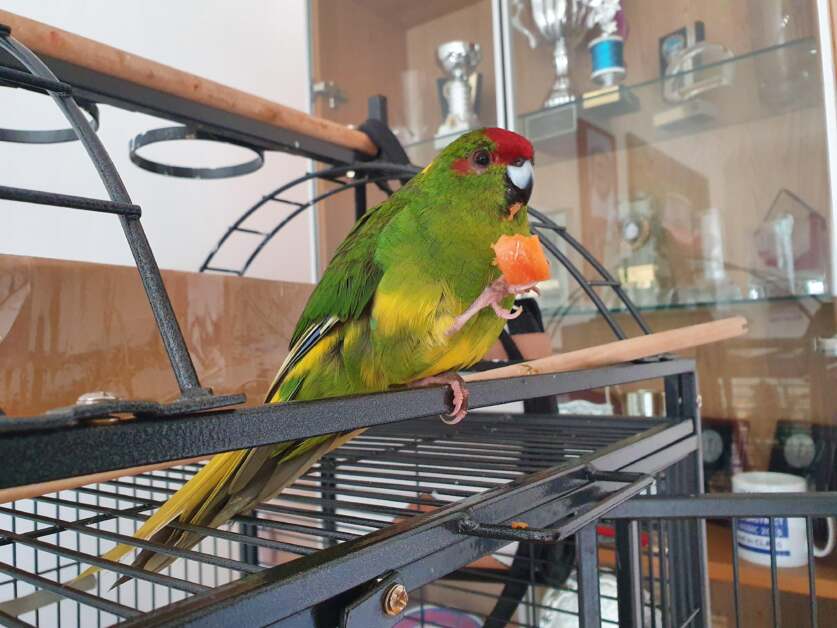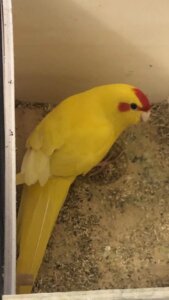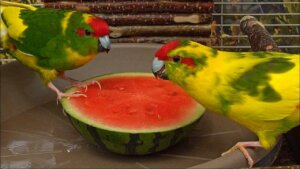Can Kakarikis Eat Peanuts? Discover the Nutritional Benefits
Yes, Kakarikis can eat peanuts, but moderation is key. Peanuts offer some nutritional benefits, but they also come with risks.
Kakarikis are curious, energetic parrots known for their playful nature. As pet owners, we want to ensure they have a healthy diet. Peanuts are a popular snack for many birds, but are they safe for Kakarikis? While peanuts contain protein and healthy fats, they can also harbor harmful mold.
This mold produces aflatoxins, which are dangerous for birds. To keep your Kakariki happy and healthy, it’s important to know how to safely include peanuts in their diet. In this blog post, we’ll explore the pros and cons of feeding peanuts to Kakarikis and provide tips for safe feeding practices.

Credit: m.facebook.com
Introduction To Kakarikis
Thinking about feeding your Kakariki peanuts? First, let’s get to know these lively birds a bit better. This section introduces Kakarikis and their unique needs.
About Kakarikis
Kakarikis are small, vibrant parrots from New Zealand. They are known for their lively behavior and vivid colors. These birds make charming pets and are very sociable.
Unlike other parrots, Kakarikis are more active. They love to explore and fly around. Their inquisitive nature keeps them constantly on the move. This means they need a lot of mental and physical stimulation.
Dietary Needs
Feeding Kakarikis requires careful thought. They need a balanced diet to stay healthy. A good diet includes:
- Fresh fruits and vegetables
- Pellets specially made for parrots
- A small amount of seeds
Providing variety is key. It ensures they get all the necessary nutrients. Avoid giving them too many seeds or nuts. These can be high in fat and not ideal for their health.
To answer the main question: Can Kakarikis eat peanuts? Yes, but in moderation. Peanuts are high in fat and should only be a small part of their diet. Always offer them unsalted and unflavored peanuts. And remember, fresh food is always best.
Peanuts In Bird Diets
Birds have varied diets. Many pet owners wonder if peanuts are safe. Kakarikis, with their lively nature, need balanced nutrition. Peanuts can be a part of their diet. But how do they fit into the bigger picture? Let’s explore.
Common Bird Foods
Birds eat seeds, fruits, and vegetables. Seeds like sunflower and millet are popular. Fruits such as apples and berries offer vitamins. Leafy greens provide essential minerals. But can peanuts be one of these foods?
Peanut Nutrients
Peanuts are rich in protein and healthy fats. They provide energy for active birds. Vitamins like B and E are present in peanuts. These support overall health. Minerals like magnesium and phosphorus are also found in peanuts. They contribute to strong bones and muscles.
But peanuts should be given in moderation. They are high in fats. Too many can lead to obesity. Also, always use unsalted and unflavored peanuts. They are the safest option for your feathered friend.
Benefits Of Peanuts For Kakarikis
Peanuts provide essential nutrients for Kakarikis, aiding in their overall health. They offer protein, healthy fats, and vitamins, making them a valuable treat.
Peanuts can be a nutritious treat for Kakarikis. These small parrots benefit greatly from the nutrients found in peanuts. Let’s explore some of the key benefits.Protein Content
Peanuts are rich in protein. Protein is essential for muscle growth and repair. Kakarikis need protein for their overall health. It helps them stay active and vibrant. A good source of protein can boost their energy levels.Healthy Fats
Peanuts also contain healthy fats. These fats are important for brain function. They support the bird’s nervous system. Healthy fats help in maintaining feather quality. They ensure that Kakarikis have shiny, strong feathers. Healthy fats also aid in the absorption of vitamins. “`Potential Risks Of Peanuts
Feeding your Kakariki peanuts can be risky. It is important to know the potential dangers. Below, we explore the main risks associated with peanuts for your bird.
Allergies
Just like humans, birds can have food allergies. Some Kakarikis may be allergic to peanuts. This can cause serious health problems.
Allergic reactions in birds can include:
- Swelling
- Breathing difficulties
- Skin rashes
If you notice these symptoms, stop feeding peanuts and see a vet.
Aflatoxins
Peanuts can contain aflatoxins. These are toxic substances produced by mold. Aflatoxins can be very harmful to birds.
Problems caused by aflatoxins:
- Liver damage
- Immune system suppression
- Potential death
Always check peanuts for mold before feeding them to your Kakariki.
Safe Ways To Serve Peanuts
Peanuts can be a tasty treat for Kakarikis, but it’s vital to serve them safely. This section explores the safe ways to serve peanuts to your feathered friend. We’ll discuss the differences between raw and cooked peanuts and the correct portion sizes to ensure your Kakariki stays healthy and happy.
Raw Vs. Cooked
Raw peanuts contain natural enzymes that can be hard for Kakarikis to digest. These enzymes can interfere with nutrient absorption, causing potential health issues. It’s best to avoid giving raw peanuts to your bird.
Cooked peanuts are a better choice. Cooking deactivates the harmful enzymes, making them safer for your Kakariki. You can boil, roast, or bake the peanuts. Ensure they are unsalted and free from any added oils or spices.
Portion Sizes
Moderation is key when feeding peanuts to Kakarikis. While peanuts are nutritious, they are also high in fats. Overconsumption can lead to obesity and other health problems.
| Bird Size | Recommended Portion |
|---|---|
| Small Kakarikis | 1-2 peanuts per week |
| Medium Kakarikis | 3-4 peanuts per week |
- Always monitor your bird’s reaction to peanuts.
- If any adverse reactions occur, stop feeding peanuts immediately.
- Introduce peanuts gradually to their diet.
By serving peanuts in a safe manner, you can ensure your Kakariki enjoys this treat without compromising their health. Remember, balance and moderation are essential for maintaining your bird’s well-being.
Alternative Nut Options
When considering alternative nut options for your Kakarikis, it’s important to understand the different choices available. Peanuts might be a popular option, but there are other nuts that are safe and nutritious for your feathered friends. In this section, we’ll explore some of the best alternatives to peanuts.
Other Safe Nuts
There are several nuts that are safe for Kakarikis to eat. Here are some examples:
- Almonds: Rich in vitamins and minerals.
- Walnuts: High in omega-3 fatty acids.
- Pistachios: Good source of protein and fiber.
- Hazelnuts: Contains healthy fats and antioxidants.
- Cashews: Packed with vitamins and minerals.
Nutritional Comparisons
Understanding the nutritional content of these nuts can help you make better choices for your Kakarikis. Here is a comparison of some key nutrients:
| Nut Type | Protein (per 100g) | Fat (per 100g) | Fiber (per 100g) |
|---|---|---|---|
| Almonds | 21g | 49g | 12g |
| Walnuts | 15g | 65g | 6.7g |
| Pistachios | 20g | 45g | 10g |
| Hazelnuts | 15g | 61g | 10g |
| Cashews | 18g | 44g | 3.3g |
As seen in the table, each nut has its unique benefits. Almonds are high in protein and fiber. Walnuts are rich in healthy fats. Pistachios provide a good balance of protein and fiber. Hazelnuts and Cashews are also nutritious options, each offering different health benefits.
Signs Of Peanut Allergies
If you are a Kakariki owner, you may wonder if peanuts are safe for your bird. While peanuts can be a tasty treat, they can also cause allergies. Recognizing the signs of peanut allergies is crucial for your bird’s health. Allergic reactions can manifest in various ways, including behavioral changes and physical symptoms.
Behavioral Changes
Kakarikis may exhibit noticeable behavioral changes if they are allergic to peanuts. They may become irritable or restless. You might observe them scratching or picking at their feathers more than usual. This behavior indicates discomfort. Pay attention to any sudden changes in their usual activities. A normally active bird may become lethargic. They might show less interest in playing or interacting with you. These changes can be subtle, so stay observant.
Physical Symptoms
Physical symptoms of peanut allergies in Kakarikis can be quite clear. These symptoms can range from mild to severe. Look for signs of difficulty breathing. Wheezing or labored breathing is a serious sign. Check for any swelling around the face or beak. Skin rashes or red, inflamed skin are also common. Your bird might develop gastrointestinal issues. This includes vomiting or diarrhea. Monitor their droppings for any changes in consistency or color.
| Symptom | Description |
|---|---|
| Breathing Issues | Wheezing, labored breathing |
| Swelling | Face or beak swelling |
| Skin Rash | Red, inflamed skin |
| Gastrointestinal Issues | Vomiting, diarrhea |
If you suspect your Kakariki has a peanut allergy, consult your vet immediately. Early detection and treatment are vital for your bird’s well-being. Keep an eye out for the symptoms listed above. This will help ensure your Kakariki stays happy and healthy.
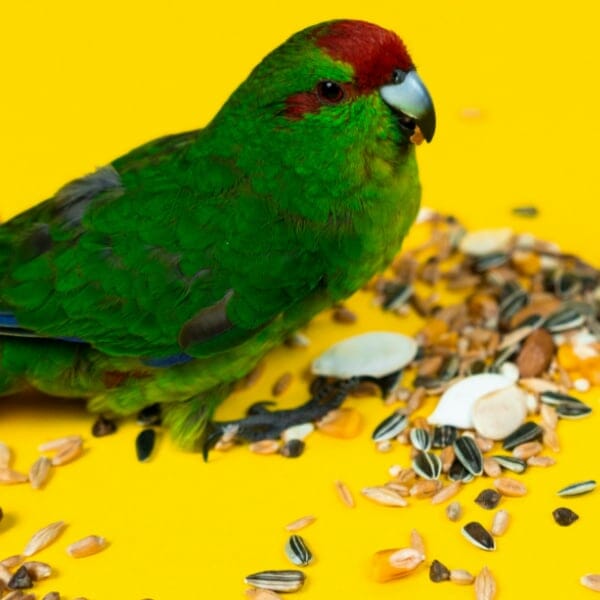
Credit: windycityparrot.com
Consulting Avian Experts
When it comes to feeding your Kakariki, consulting avian experts is crucial. These professionals can provide guidance on safe and nutritious foods for your bird. Peanuts, for instance, may seem like a tasty treat, but their suitability for Kakarikis needs expert advice.
Expert opinions help you make informed decisions. Let’s explore insights from veterinarians and bird nutritionists.
Veterinarian Advice
Veterinarians specialize in animal health, including birds. They recommend foods that support a bird’s overall well-being. Peanuts, while tasty, can pose risks. They may contain aflatoxins, harmful to birds. A vet can guide you on safe, peanut alternatives. They ensure your Kakariki’s diet is balanced and healthy.
Bird Nutritionists
Bird nutritionists focus on avian diets. They study what nutrients birds need. Peanuts can be high in fat, not ideal for Kakarikis. A nutritionist can suggest nutritious seeds, fruits, and vegetables. They tailor diets to meet specific needs, promoting longevity and vitality for your bird.
Consulting these experts helps you provide the best care for your Kakariki. They ensure your bird’s diet is both safe and nutritious.
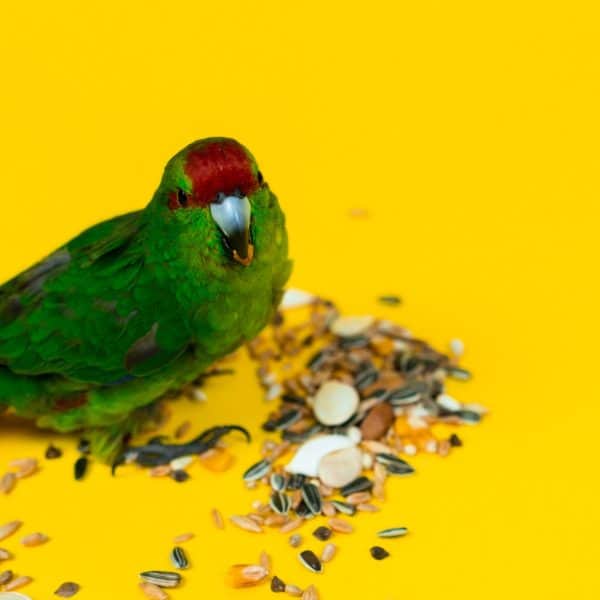
Credit: windycityparrot.com
Frequently Asked Questions
Can Kakarikis Eat Peanuts Safely?
Yes, Kakarikis can eat peanuts, but only in moderation. Peanuts should be unsalted and unflavored. Too many can cause health issues.
Are Peanuts Good For Kakarikis?
Peanuts provide protein and healthy fats. However, they should be given as a treat, not a staple.
How Often Can Kakarikis Eat Peanuts?
Kakarikis should have peanuts sparingly, around once or twice a week. Overfeeding can lead to obesity.
Should Peanuts Be Raw Or Roasted For Kakarikis?
Raw peanuts are preferable. Roasted peanuts may contain additives and higher fat content, which isn’t ideal for birds.
Conclusion
Peanuts can be a tasty treat for Kakarikis. But moderation is key. Too many peanuts can cause health issues. Always remove the shells. Offer peanuts as a small part of their diet. Balanced nutrition is vital for happy, healthy Kakarikis.
Consult a vet for personalized advice. Enjoy watching your feathered friend thrive!
Hello Dear, I'm Poli Kolymnia, owner of many birds (including budgies).
With a deep passion for these feathered companions, I'm here to share my expertise and extensive knowledge on birds care.
My articles cover essential topics like diet, housing, care, and health, providing practical tips to help you create a happy and thriving environment for your birds.
